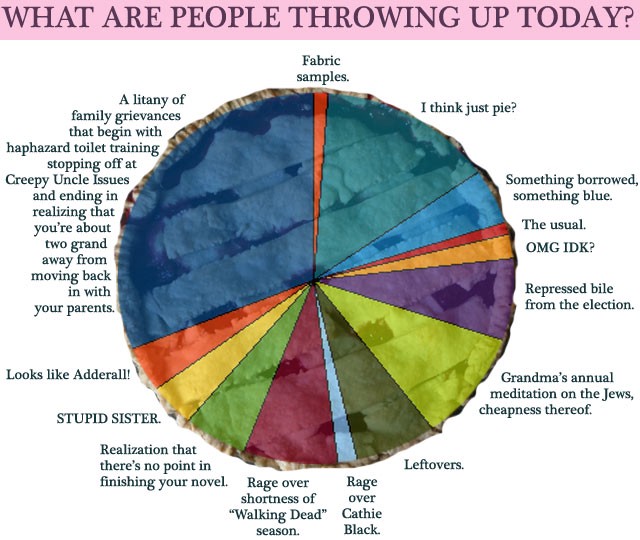'Empire Strikes Back' Director Dies
Irvin Kershner, director of the good Star Wars movie, has died at the age of 87.
Silvio Berlusconi Is The Italian Dream
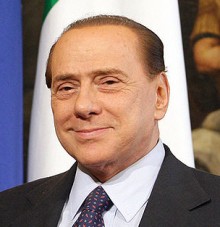
How to throw a party, Berlusconi-style: “”There were lots of young girls, I think they were minors but we didn’t speak to each other as we were told not to talk. I gave my number to Berlusconi’s secretary, I can’t remember her name, she was his organiser and she said I would be called again. I was called on my mobile by Berlusconi. He said ‘I am the dream of Italians’ I said, ‘who is this ?’ and he said ‘It’s the Prime Minister of Italy.’ It was a beautiful moment to get to know him.” In related news, Berlusconi denies the US government’s assessment that his “frequent late nights and penchant for partying hard mean he does not get sufficient rest.” Sure, he’ll host a party once a month or so, but it’s always a “dignified and elegant” affair.
Will Risk Life For Paycheck
“I was thinking, if he gets hit I can’t go to work. It’s Sunday. I can’t miss out. It’s a time-and-a-half day.”
— Grocery store employee Carlos Flores explains why he saved a man who had fallen on the subway tracks from being struck by an oncoming train.
Boozed-Up Whip Cream: The Next Four Loko, or Another Sign of Our Impending Doom?
Jesus Christ, why don’t people just drink BOURBON anymore? No wonder this country is falling apart. Okay, yes, I am mildly curious if the nitrous you wind up sucking down every time you buy a bottle of whip cream is affected by the presence of alcohol, but other than that my objection stands. JUST DRINK REGULAR ALCOHOL, you pussies. It is the only thing ever made that needs no enhancement.
The Screening Room: Reading On and Off Paper
“For a time, the iPad made everything worse. It was too easy to check social media, for example. When Dustin began feeling like an internet widow as I walked through the apartment, silently moving from device to device, we set rules on usage, which included talking to him again. The iPad then quickly disappointed: A visit to Hulu asked me to pay for something I could watch for free on my computer. My current print magazine subscriptions did not transfer to the iPad — I would have to either repurchase my magazines, an unpleasant idea, or switch to the iPad-only version, and at only a slight discount compared to the print-subscription rate. Meanwhile, my subscriptions to Granta, Harper’s, and The New Yorker, for example, provided me with online access to their archives through my computer in a way the apps, for now, can’t. The Huffington Post app was a relief — no comments! — and then an update provided the angry squadrons I’d been happy to avoid.”
Leslie William Nielsen, 1926-2010
by Jeff Laughlin
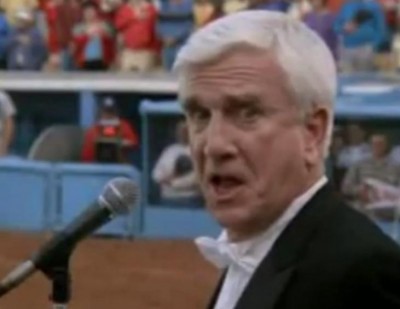
Among the most humorless people I knew were those who despaired at my love for the Naked Gun trilogy. Blinded by the shuffle of dick and fart jokes — these are the objects of scorn for critics of the Zucker, Abrahams and Zucker comedies — they couldn’t see the inventive plot excursions and genius hilarity. Presumably they also didn’t see the genius of the straight man amid the chaos: Sergeant Frank Drebin, Detective Lieutenant Police Squad.
After the first time I watched The Naked Gun: From the Files of Police Squad, I aped the dialogue like a crushed-out teen with love song lyrics. I contend that the star-studded booth of broadcasters was some of the best satire ever on sports and broadcasting. The baseball scene introduced me to the sustainably absurd. One evening, in the din of M*A*S*H reruns with my dad, we stumbled upon HBO replay value we’d never known. I didn’t understand the brilliance of a full-body condom at the time, but he did. I caught the woman showering in the background of the police station. He didn’t. There was so much for both of us. The movie was everything we wanted, and it all centered on the shoulders of Leslie Nielsen.
My father went on to show me the Airplane movies, the Naked Gun sequels. Later, I saw that many others failed to feel the glee I experienced with Wrongfully Accused, Spy Hard, Repossessed, and Dracula: Dead and Loving It. I was a junkie. Nielsen’s stock goofy-yet-staid facade against anarchy was addictive.
Through the years, he was less and less involved in Hollywood proper. “The studio just doesn’t get the joke though,” one of the Zuckers said when Naked Gun 4 was declared never to be made, and that was a reflection on Nielsen. He’d been working for two and a half decades before Airplane!, and so he was aging and it showed. Unlike the shtick of Rodney Dangerfield (which never got old even as it got tattered), Nielsen suffered publicly without new or undiscovered material — shunted to the sidelines of the next generation of youth-oriented shtick comedy with the rise of the Scary Movie franchise. He became a ghost of TBS.
Aided by my current unemployment, today I will watch as much Nielsen as I can handle. I’ll Youtube, watch for reruns, rent, search. Between “The Simpsons” seasons 3–9, Nielsen and the occasional flash of genius this world has to offer (“Arrested Development” immediately comes to mind), there isn’t that much comic genius to go around, and you must celebrate it when you can.
Nielsen bridged gaps. His shock of silver hair and unbreakable facade created a self-selecting, non-exclusive fraternity. When people frowned at Nielsen’s work, I knew they weren’t bad people: they were just misaligned. They found the obvious humor Neilsen presented detrimental to their own idea of comedy. But they were mistaking the art for the artist.
The money quote there from Kareem Abdul-Jabbar (about a minute in): “I definitely don’t think they are crazy, I just think they have a justifiable grudge against a lot of the B.S. we see in the world.” (If you watch all three parts of the making of Naked Gun 2 ½), you see how serious the labors were that Nielsen performed for comedy.) Abdul-Jabbar was talking about the directors, and that was why Nielsen was their avatar. In part three of the Cinemax special, Nielsen says of himself and his own “serious” movie-making history, in which he briefly was a romantic lead, a potential box office commodity: “The expectation of myself, I really think that followed me all my life. Now I can be as dumb and as stupid as I want.”
Their dumb and stupid work together presented an opposing view to the plot-driven “Animal House” or “Blues Brothers” line of comedy. Where those comedies relied on real-life absurdity, situational comedy, Airplane and Naked Gun supplied an absolute zero, of sorts, for comedy lovers. Nielsen was cartoonish and garrulous while keeping his character in place. In opposition to that line — Belushi’s overpowering scenes, Farley’s lovableness, Ferrell’s character-acting, Carrey’s overacting — Nielsen nursed the scenes through their conclusion. Whether falling down stairs or telling a woman he loved her, he was in control by proxy.
Still hanging on the wall of my old Astoria apartment is the yellowed Village Voice obit for Richard Pryor. Now here in my North Carolina apartment, I’ll put up Nielsen’s, and I’ll persevere the way I always do in times of tragedy. I have even prepared a statement in case anyone asks me how I’m dealing with Nielsen’s death: “I just think about baseball.” This is just one more terribly austere situation; how can you not laugh?
Jeff Laughlin is the editor of 10 Listens and is finishing a new book of poetry called “Alcoholics Are Sick People.”
November Was Much Less Horrible Than Predicted
November Was Much Less Horrible Than Predicted
Well, after all that fretting, November didn’t turn out to be so terrible, did it? After I made such a big deal about how it was the worst month of the year, bound to bring us to new depths of misery, it wasn’t actually all that bad.
Sure, it started off rotten, what with the results of the election. But that should not have surprised anyone. And soon enough, we’d mostly forgotten about it. (Probably because of all the lead in our drinking water and favorite kitschy vintage glassware.) By the second week of the month, we were back to being distracted by the foibles of Lebron James and Gwyneth Paltrow, and Matt Lauer playing Kanye West against President Bush, and royal engagement announcements and handsy T.S.A. agents, and Sarah Palin’s second book and Bristol Palin dancing on TV. From the no news is good news perspective, we were doing all right!
And then Patti Smith won the National Book Award, and Kanye’s album came out every bit as awesome as anyone could have hoped it would. And Aung San Suu Kyi was released. And, along with it’s new, media-executive boss, the New York City Department of Education will have an educator in a position of power after all. And despite the usual overindulgence in pie and fabric samples, Thanksgiving this year was actually not too unbearable.
But best of all, most surprisingly not-depressing of all, the weather was beautiful. The trees hung onto their leaves longer than expected, and the days, ever shortening though they were, were clear and crisp and brightened by a tastefully low-hanging sun. In fact, there was a time there, around the middle if the month, when, if you happened to be sitting on a folding chair in Madison Square Park around 4:30 on a Wednesday afternoon, because you just dropped your kid off at a nearby robot-building class (which, I don’t know… ask his mother), and you were lucky enough to be drinking a glass of red wine from Shake Shack, and reading Larry McMurtry’s The Last Picture Show (which, God, it’s so good — you totally should have read it fifteen years ago when your friend Jen first recommended it), and closed the book when it got too dark to see the words, and looked up and saw the setting sunlight reflecting off the Met Life building, and that there was a curtain of small blinking light bulbs hung in the center of the park’s main lawn (which, it turns out, is artist Jim Campbell’s installation, Scattered Light, which will be there through February), and noticed that the way that it billowed in the breeze made it look like nothing so much as a field in the country thick with midsummer fireflies, you might breathe a deep breath of the cool, crisp, yellow-smelling air and feel a truly rare sort of contentment, and think to yourself, Huh, at this moment, there is no place I’d rather be in the world. And then, How could I have been so wrong? November is not the worst month of the year, it is the very best month of all!
So mostly, the past 30 days offered further evidence to support the theory that the universe is controlled by an unseen power that works in direct opposition to whatever I think will happen. Or, in other words, in direct correlation to whatever will make me feel dumb. Or, more dumb. I mean, Jesus, publically apologizing to a full calendar month. That’s ridiculous.
A Non-Reader's Guide to Sarah Palin's "America by Heart"
by Jordan Carr
Introduction
Palin comes out firing with the controversial claims. For instance: Calvin Coolidge is “one of our most overlooked presidents.” Doesn’t Glenn Beck hold a patent on making it seem like the people who held power right before the Great Depression were American heroes? Sarah also makes reference to “my beautiful grandbaby.”
The introduction ends with this rather disturbing mission statement: “This is my America, from my heart, and by my heart. I give it now to my children and grandchildren, and to yours, so they will always know what it was like in America when people were free.” (Just for starters, this presumes that there will still be books in this near future when people are no longer free.)
Best line: “I have a kind of internal compass that keeps me sane and grounded when the media attack dogs bark and the days on the road get long.” This metaphor is more mixed than a cement mixer at a singles mixer.
Chapter One — We The People
Mr. Smith Goes to Washington is the kind of “happily, unabashedly pro-American” movie Hollywood doesn’t make anymore. For those unfamiliar, the movie is the story of an unelected Senator’s effort to saddle our children with debt by taking out a federal loan to buy some land for an exclusionary special interest to set up a boys’ camp.
A study in contrasts: Sarah is “obsessed with constitutional theory,” whereas progressives want “Supreme Court justices who will violate their oath of office.”
The chapter gets going when the topic moves to race. You can tell we are going to have an open, honest discussion on the topic when Sarah writes, “The worst thing you can say about a fellow American in politics is that he is a racist. It just doesn’t get any more damning than this accusation.”
Sarah remembers the 1964 Civil Rights Act and 1965 Voting Rights Act and asks, “Wouldn’t it be more constructive to celebrate these great achievements instead of dwelling obsessively on the problems that made them necessary in the first place?” These days, Americans are too busy to be racists. Still, “It’s a shame that not everyone wants to quote Dr. King these days.” She then (I’m guessing here) kicked a can, put her hands in the pockets of her denim overalls, twirled a big toe on the ground and sighed.
On the Civil War: “Hundreds of thousands of Americans died, but slavery finally died with them. And in an important and overlooked way, our Founders began this painful process.” To be clear, she’s praising the Founders — she capitalizes that way throughout the book, as if they were a minor league baseball team or something — for helping start a war that took place after they were all dead over a horrible institution they enshrined in law. Awesome.
Best line: “Thomas Jefferson … owned slaves and may have had a sexual relationship with one of them.”
Two — Why They Serve
As this chapter’s title shows, Palin is in the awkward position of trying to take credit for being troop-friendly without ever having been one herself. It’s a little Chris Farley Show-esque.
Her son Track (a troop, himself!) gave up his seat on a flight home on September 11, 2009 to accommodate a fellow soldier who had a medical scare, which forced him to spend an additional month in Iraq waiting for another flight. (Or did he?)
Iraq War movies bombed (sorry) because they were anti-American, but no opinions on the actual Iraq War are offered. Oh, and John McCain called one of the North Vietnamese guards in his POW camp “The Prick.”
Best line: “Believe me, nobody is more demanding when it comes to going to war than our military moms. If you’re going to send our sons and daughters into harm’s way, you’d better have a pretty good reason.” For context, here’s the time she pretty much endorsed bombing Iran.
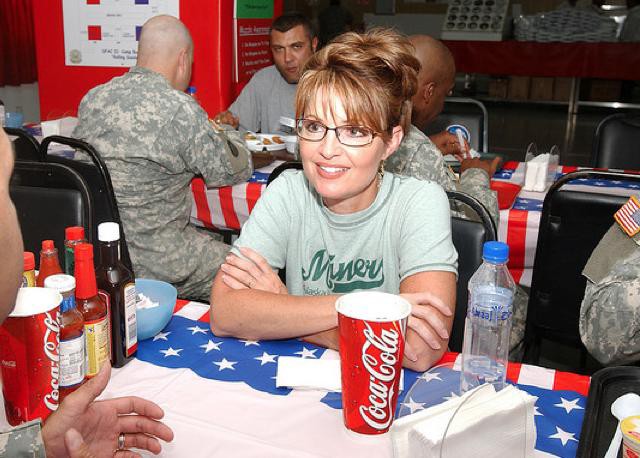
Three — America the Exceptional
America’s awesome. There, I said it. And nobody disagreed? We can move on, right? Nope, this chapter stretches for 29 more pages.
To prove this point further, Palin quotes Charles Murray, the co-author of the 1994 book The Bell Curve, which most famously drew some controversial conclusions regarding intelligence and race. Is this a clever ploy to win over the important racial-eugenicist market, or am I reading too much into this?
Best line: “I wish [Milton Friedman] and his wife, Rose were still with us today to defend free market principles from the likes of Michael Moore.”

Four — Raising (Small-r) Republicans
Sarah Palin runs off a litany of Bristol’s activities from her high school days, then says, “she was doing all that, thankfully, so she would be too busy for anything else — or so I deluded myself.” So, the claim is that Bristol had just enough time to have a boyfriend, but not enough to ever have sex with him. This is not entirely believable.
For those of you keeping score at home, Palin has claimed that Americans are too busy to be racist, and she thought her daughter was too busy to have sex. Idle hands (no Devon Sawa) are the devil’s playground and everything, but will even Sarah Palin SuperFans buy this reasoning?
I’m not saying this book has a lot of filler, but on pages 99–100, she runs a lengthy excerpt of an Onion article.
Warning: If people saying insensitive things about Hurricane Katrina bums you out, just skip the next paragraph of Sarah Palin’s thoughts on the topic and rejoin when we’re discussing Murphy Brown.
“Hurricane Katrina revealed something other than government incompetence. It revealed a population of Americans dependent on government and incapacitated by the destruction of the American family.” And what was the difference between many areas of the Gulf Coast and New Orleans? “In many cases, the difference was strong, intact families.”
Bringing up the Murphy Brown/Dan Quayle thing like this reminds me of a five-year-old protecting a classmate from a bully, only the five-year-old doesn’t realize that the victim was was not being mocked for his support of two-parent households so much as his decision to dedicate a speech to attacking a fictional character — the analogy falls apart a little at the end. It’s cute that she tried to defend him, but ultimately pretty silly and pointless.
Palin addresses how Murphy Brown relates to her own family situation, but misses the point again when she says that people mock Bristol’s newfound support of abstinence as hypocritical. The bigger thing — as the argument against abstinence-only education always has been — is that it’s unrealistic. If even playing basketball, chairing the Junior Prom Committee and working in a coffee shop couldn’t doesn’t guarantee abstinence, what will?
In other Bristol news, “she engaged in an uplifting, family-oriented show called Dancing with the Stars.”
Best line is this magnificent segue that follows the Palin family update section: “But while my family has been growing and developing, America and the American family have been under almost continuous assault.”
Five — Rise of the Mama Grizzlies
Women: You get a chapter! You get a chapter! You get a chapter! All of womankind gets a chapter!
Palin goes from referring to herself as “an Alaskan chick” to being really angry that in 1993, people were saying more women get beat on Super Bowl Sunday to Frederick Jackson Turner’s Frontier Thesis in a matter of eight pages. The takeaway: some people think being a feminist requires also being a liberal, but those people are wrong, and quite possibly advocates of Nazi-like eugenics.
Best line: “But if they thought pit bulls with lipstick were tough, wait until they meet a mama grizzly.” Only four more chapters.
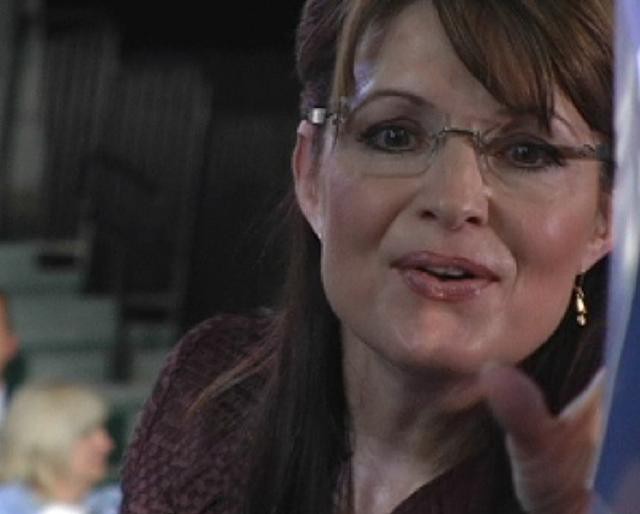
Six — Are We Really the Ones We’ve Been Waiting For?
Spoiler alert: no. We are not. Palin talks about how great it was when John F. Kennedy set a goal for America to land on the moon. It was optimistic, utopian, and didn’t really offer a lot in the way of practical benefits. This is somehow infinitely more admirable than trying to insure every American.
Then there’s a bit where she blasts Barack Obama for downplaying America’s greatness in a way that will not “inspire my kids and other American kids to work hard and dream big.” Oh yeah? Well, Barack Obama’s stock autograph for children is “Dream Big Dreams.” So there.
There’s a heartwarming (seriously) story about how when she was training for a marathon, her eldest son Track, then sixteen, would drive her route ahead of her so that he could leave water bottles and encouraging notes at every mile. Isn’t that nice? That’s nice!
But then I reread the passage and wondered: water bottles? Maybe it was just one? Nope, she says she ran “water bottle to water bottle,” and that she was training for a marathon. Were there days where she was either throwing away or carrying around 20 water bottles? Would Track have to drive around after she was finished and pick up all the water bottles she had discarded? Somehow this is the biggest betrayal of trust and narrative in the whole book.
Sarah Palin is a character in NBA Jam, but so far as I can tell, she is not in NBA Live, and if she were, her awareness rating would have to be like a 3. My evidence? Her second memoir in two years includes the sentence, “I believe in a humbler, less self-involved America.”
Best line: “We may be creating an entire generation of entitled little whiners.”
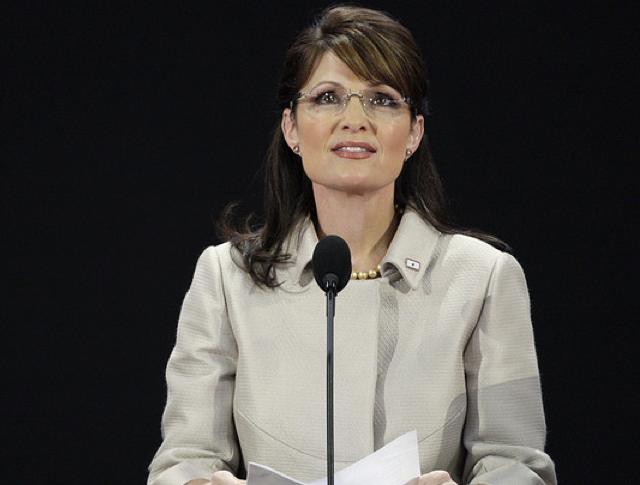
Seven — The Indispensable Support of Freedom
This chapter is about freedom, by which she means freedom of religion, by which she means public, state-sanctioned displays of religion. She tells the tale of how John F. Kennedy had to go before the American people and basically promise not to let the Pope run America, and is dismayed that this is the way things used to be, but now they’re better. Anyway, she takes the opportunity to dance on Ted Kennedy’s grave: “It is perhaps not surprising … that his brother Ted Kennedy would go on to have a long career advocating positions directly at odds with his Catholic faith (which was by all accounts sincere).”
Boy, wasn’t it great when Mitt Romney didn’t pull a JFK? He insisted that his religion mattered to him. And he’s not just a Catholic, he’s a full-fledged, magic underpants, non-swearing Mormon. From Massachusetts. Did I mention he’s a Mormon from Massachusetts? And good for him for not being ashamed of it. Great guy.
Best line: “Lincoln did not presume to know which side God favored in the Civil War.”
Eight — I Hear America Praying (I promise I didn’t make this up)
Only three pages into this one, and we’re already quoting Newt Gingrich on morality. Not a good sign.
In the last chapter, we learned how religion in the public sphere is increasingly accepted to the point where we expect our politicians to publicly affirm rather than deny their religious commitments.
This chapter though, is about how religion is under attack. Example: “When I was mayor of Wasilla, I had to fight for six Christmases to keep the baby Jesus manger scene on display on Wasilla Lake.” Egad! That’s two more Christmases than Reese Witherspoon had to deal with in the holiday classic, Four Christmases. In related news, amazingly, Reese’s direct ancestor John Witherspoon’s 1782 Thanksgiving sermon is quoted at length on page 192.
Palin argues that religion was responsible for abolitionism and the civil rights movement. Not buying it? “Martin Luther King, Jr., was jailed for taking part in a nonviolent protest against racial segregation in Alabama in 1963, his famous ‘Letter from Birmingham Jail’ was both a refutation of racial segregation and a repudiation of those who opposed civil disobedience in pursuit of civil rights — a refudiation, if you will — cast in explicitly religious terms.”
Seeing her quote Martin Luther King, Jr. like this makes me feel like Kurt Cobain must have felt in that Lynn Hirschberg Vanity Fair article when they’re at a 7-Eleven and he sees a heavy metal dude get out of his van wearing a Nirvana shirt. I’m used to it now, I guess.
Best line, recalling George Bush’s words after 9/11: “‘The prayers of private suffering… are known and heard and understood.’ How I clung to those words in those frightening days.” Isn’t quoting George Bush, mentioning 9/11 and literally talking about how you clung to religion when you were scared a form of low-level entrapment?
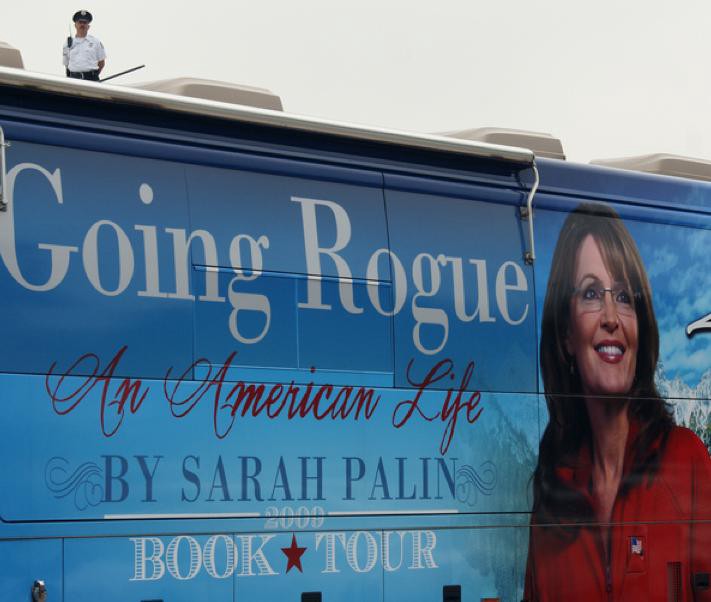
Nine — Our North Star
This chapter is most notable for the extended film critiques. Unfortunately, Palin gives Jason Reitman way too much credit for the plot of Juno, when the real pro-life advocate here is the ex-stripper with the tattoo of a redhead in a bikini and bondage.
“A European movie might have had Juno get her abortion in the opening scene and then spend the next hour and fifteen minutes smoking cigarettes and pondering the meaning of life. It would have been depressing and boring.” I guess Four Months, Three Weeks, and Two Days isn’t on the Palin’s Netflix queue.
Best line: “Many Americans, I think, are a lot like Juno.”
Conclusion — Commonsense Constitutional Conservatism
This section is a bit anticlimactic, and is perhaps most notable because the total number of mentions of Ronald Reagan in this book (33) narrowly passes the number of Reagan mentions in Going Rogue (31).
Best line, describing a lunch with the late Ted Stevens at her kitchen in Wasilla: “That day, he brought me a U.S. Senate coaster, which he had signed and inscribed with the encouraging words ‘Keep up what you are doing!’ I knew then, as I know today, that his heart was always with the people of the frontier.”
Acknowledgements
America by Heart is an instructional guide in to how to generate enough material to write a memoir only one year after your last memoir came out in only three easy steps.
1) Hire a ghostwriter
This one presumably is Jessica Gavora, wife of National Review’s Jonah Goldberg, who is thanked in the acknowledgments and likely responsible for the striking similarities between a section of this book and a recent Goldberg column.
2) Shrink the book:
Based on Amazon’s figures, America by Heart is 128 pages shorter than Going Rogue and has a surface area that is 5.8 inches smaller. It has, however, three more chapters.
3) Memoir real estate is about three things: Quotation! Quotation! Quotation!
The unsung hero of this book is the long quotation. In 304 pages, I counted no fewer than 88 separate block-quoted excerpts that measured at least four lines (see the appendix below), but usually were about half to three quarters of a page — and sometimes actually ran several pages. Quotations have all the added benefit of writing your own words, but without the effort or potential troubles that come with being held responsible for things you’ve put in writing in your own name.
Also, if possible, have an insanely rabid fan base who doesn’t care at all about the content of your book so long as you talk about how awful liberals are and how you’re both awesome and exactly like them. That’s good too.
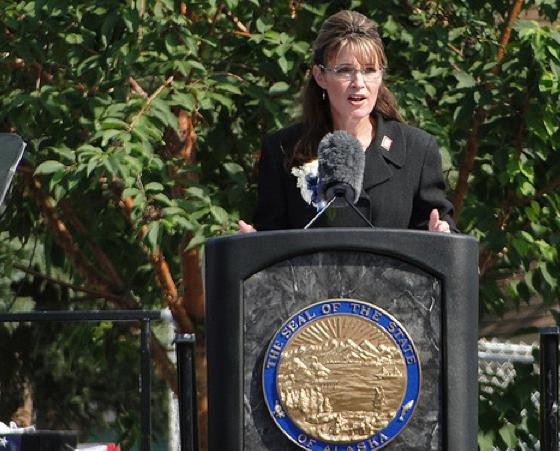
Appendix: Sources and Pages of Appearance of all Block Quotations in America By Heart by Sarah Palin
- Calvin Coolidge’s speech on the 150th Anniversary of the signing of the Declaration of Independence (xix, 18)
- Ronald Reagan (xx)
- Senator Jefferson Smith’s filibuster (4)
- Ronald Reagan’s 1987 State of the Union (6)
- Preamble to the United States Constitution (8)
- Declaration of Independence (10)
- Barack Obama 2001 interview (13)
- Supreme Court oath of office (15)
- An essay by the late constitutional scholar Robert Goldwin (29)
- Barack Obama’s 2008 speech on race (31)
- Dr. Martin Luther King Jr.’s “I Have a Dream” speech (33)
- William Bennett’s “Twelve Great Reasons to Love a Great Country” from his book The American Patriot’s Almanac (38)
- 1843 interview between a young historian and ninety-one-year-old veteran of the Battle of Lexington and Concord, Captain Levi Preston (39)
- John Ford describing the Battle of Midway (41)
- A poem about veterans that Palin’s uncle emailed her (43)
- Toby Keith’s “Courtesy of the Red, White and Blue” (44)
- Ronald Reagan’s speech on the fortieth anniversary of the D-Day invasion (44)
- Captain Tony Simeral on Sergeant Henry Erwin (46)
- John McCain’s Faith of My Fathers (50, 51)
- A description of the American military man that Palin’s brother sent her (55)
- Karl Shapiro’s “Elegy for a Dead Soldier” (60)
- Rich Lowry and Ramesh Ponnuru in National Review (64)
- Sociologist Charles Murray (66)
- Ronald Reagan’s 1981 letter to then-Soviet premier Leonid Brezhnev (67)
- John F. Kennedy’s inauguration speech (70)
- The Tenth Amendment to the United States Constitution (72)
- Ernest Gruening’s speech at the 1955 Alaska Constitutional Convention (73)
- Thomas Jefferson in 1791 (75)
- 1947 Indiana state legislature resolution (78)
- NBC founder David Sarnoff (83)
- Professor Luigi Zingales (86)
- Milton Friedman (88)
- Onion article titled “Miracle of Birth Occurs for the 83 Billionth Time” (99)
- Tony Woodlief’s Somewhere More Holy (101)
- Journalist and Weekly Standard editor Fred Barnes (103)
- Whittaker Chambers’ Witness (106)
- The collected letters of “an emigrant Frenchman turned American farmer with the impressive name of J. Hector St. John de Crèvecoeur” (108)
- Letter from Abigail Adams to John Adams (110)
- Letter from John Adams to Abigail Adams (111)
- “One of the nation’s foremost experts on the family, Allan Carlson” (112)
- Political scientist and James Q. Wilson’s Wall Street Journal op-ed on the occasion of the tenth anniversary of Dan Quayle’s Murphy Brown speech (118)
- Reverend Bill Banuchi of the Marriage and Family Savers Institute (124)
- Columnist and former White House speechwriter Mary Kate Cary (131)
- Margaret Thatcher (133)
- National Review columnist Kathryn Lopez (138)
- Elizabeth Cady Stanton’s Declaration of Sentiments (140)
- Author and feminist Christina Hoff Sommers (143)
- Someone writing about Carolina Nichols Churchill (146)
- “the wonderfully named Crystal Brilliant Snow Jenne” in 1936 (148)
- Crystal Snow Jenne’s “Idle Thoughts of a Woman Legislator” (149)
- Colleen Carroll Campbell in post on the Washington Post’s “On Faith” blog (151)
- Teddy Roosevelt speech in Chicago, 1899 (162)
- Booker T. Washington’s autobiography, Up from Slavery (171, 173)
- American Enterprise Institute president Arthur Brooks’ The Battle (177)
- Mitt Romney (186, 187)
- Letter from John Adams to the officers of the Massachusetts militia in 1798 (189)
- Reverend John Peter Gabriel Muhlenberg in a January 1776 sermon (190)
- John Witherspoon’s Thanksgiving Day sermon, 1782 (192)
- George Washington’s Farewell Address (194)
- Antonin Scalia’s dissent in McCreary County v. ACLU of Kentucky (197)
- Alexis de Tocqueville (199)
- George Washington’s letter to the Hebrew Congregation at Newport (201)
- Abraham Lincoln’s Second Inaugural Address (204)
- Newt Gingrich’s Rediscovering God in America (209)
- Ronald Reagan’s “evil empire” speech (212)
- Jonah Goldberg (215)
- 2006 New York Times editorial, “The Gospel vs. H.R. 4437” (217)
- Martin Luther King, Jr.’s “Letter from Birmingham Jail” (219, 220)
- Ben Franklin at the Constitutional Convention (222)
- Antonin Scalia (223)
- George W. Bush’s speech at the National Cathedral, September 14, 2001 (224)
- FDR’s D-Day prayer (226)
- Emily Dickinson’s “I never saw a moor” (230)
- Badger Clark’s “A Cowboy’s Prayer (231)
- Alcoholics Anonymous (incorrectly attributed), “Serenity Prayer” (239)
- Eunice Kennedy Shriver at the 1968 Special Olympics (242)
- Reader’s Digest’s story of Curtis Pride’s first major league RBI (244)
- Dr. Charles Stanley’s How to Reach Your Full Potential for God (246, 247, 248)
- Max Lucado’s It’s Not About Me (249, 251, 252)
Jordan Carr is a student at Stanford and was a 2010 Summer Reporter at The Awl.
Photographs, from Flickr, in order, by asecondhandconjecture, asecondhandconjecture, WEBN-TV, Amir Farshad Ebrahimi, sergio_leenen and FairbanksMike.
We're Thankful We're Off Today
Have a great Thanksgiving, everybody! If you’re looking for a recipe at the last minute you have certainly come to the right place! In any event, be well. We think you’re all pretty awesome.

